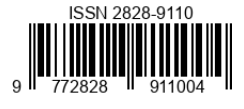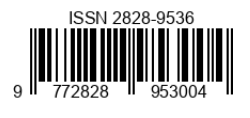Pengaruh Keamanan terhadap Pengembangan Pariwisata Maritim di Indonesia
DOI:
https://doi.org/10.56910/nawasena.v3i3.1772Keywords:
security concept, tourism development, local economy, security threats, maritime tourismAbstract
The influence of security on the development of maritime tourism in Indonesia cannot be separated from Changing concepts of security in international relations. Human security, including its economic, food and environmental dimensions, is crucial for the sustainability of the marine tourism sector. Threats such as poverty and human rights violations have a direct impact on this industry, which depends on social and political stability. Managing environmental security threats is essential to ensure the maritime tourism sector can thrive and benefit local communities economically. This ponder employments a subjective approach to analyze security's influence on maritime tourism development in Indonesia. The information appears a critical increment within the number of remote visitor visits. In any case, oceanic security issues, such as robbery and unlawful angling, remain significant challenges that have to be tended to so that Indonesia can draw in more visitors and venture whereas fortifying the nearby economy and coastal communities. The novelty of this study is due to the need for more literature discussing the influence of security on the development of maritime tourism in Indonesia.
References
Nautic, P. (2023, 12). What is Maritime? Definition & Meaning | 2024. Diambil kembali dari Primo Nautic. Statistik, B. P. (2024). Jumlah kunjungan wisatawan mancanegara ke Indonesia menurut kebangsaan. Diambil kembali dari Badan Pusat Statistik.
Adhikari, A. S. (2024). The Concept of International Security. Hasanuddin Journal of International Affairs, 4(2), 78–89. https://doi.org/10.31947/hjirs.v4i2.34797
Campbell, J. R. (2010). Transnational Security Threats to Indonesia. Issues for Engagement Asian Perspective on Transnational Security Challenges, 2–20. http://www.apcss.org/Publications/Transnational Report version 20 Dec 2000.htmlhttp://www.apcss.org/wp-content/uploads/2012/02/48-62-Transnational-Security-Threats.pdf
Dunusinghe, P., & Beligahawaththa, B. (2021). Impact of terrorist attacks on tourist arrivals : Evidence from Sri Lanka Impact of terrorist attacks on tourist arrivals : Evidence from Sri Lanka. January.
Fardhal Virgiawan Ramadhan, & Ade Chaerul. (2023). Peluang dan Tantangan Indonesia Menuju Poros Maritim Dunia: Perspektif Politik Internasional. TUTURAN: Jurnal Ilmu Komunikasi, Sosial Dan Humaniora, 1(3), 262–272. https://doi.org/10.47861/tuturan.v1i3.460
Ibraj, B., Alushllari, M., & Hysa, F. (2024). Environmental Security, Environmental Crime and National Security. International Journal of Religion, 5(11), 4890–4900. https://doi.org/10.61707/1ky4w568
Koukakis, G. (2024). Understanding National Security - Part II : The Component of Economic Security. September.
Mu’aqaffi, G., Octavian, A., Asih, B., Maritime, Y., & Programme, S. (2021). Unveiling Indonesia’s Maritime Security Interests in the ASEAN Outlook on the Indo-Pacific. International Journal of Innovative Science and Research Technology, 6(11). www.ijisrt.com298
Netto, A. P. (2009). Tourism Ediïed by in lssues Philosophicol. Aspects of Tourism, December 2009, 43–61. https://doi.org/10.21832/9781845410988-004
Ola Oktavia, Jonni Mahroza, Lukman Yudho Prakoso, Tasdik, T., Sri Patmi, & Rudi Sutanto. (2024). Enhancing Maritime Security In Indonesia: A Case Study Of Indonesian Coastguard Approach To People Smuggling In Strategic Ocean. International Journal Of Humanities Education and Social Sciences (IJHESS), 3(6), 3047–3054. https://doi.org/10.55227/ijhess.v3i6.1073
Singh, A., & T. Easow, D. D. (2023). Systematic review on the Benefits and Challenges of Maritime Tourism. Journal of Advanced Zoology, 44(3), 725–745. https://doi.org/10.17762/jaz.v44i3.860
Taufik, M., Gunawan, I. K., Khairina, E., & Imawanto, G. A. (2024). Review Of The Maritime Tourism Development Model In The Anambas Islands Through A Digital Approach. Journal of Governance and Public Policy, 11(2), 167–179. https://doi.org/10.18196/jgpp.v11i2.20009
Ugwu, Chinyere, N; Eze Val, H. U. (2017). International Digital Organization for Scientific Research IDOSR. Idosr Journal of Science and Technology, 3(1), 37–46. www.idosr.orgAsuketal
Wijaya, D. P., & Laila, N. (2024). Jurnal Pariwisata Indonesia. 1(2), 131–145.
Downloads
Published
How to Cite
Issue
Section
License
Copyright (c) 2024 Nawasena: Jurnal Ilmiah Pariwisata

This work is licensed under a Creative Commons Attribution-ShareAlike 4.0 International License.








